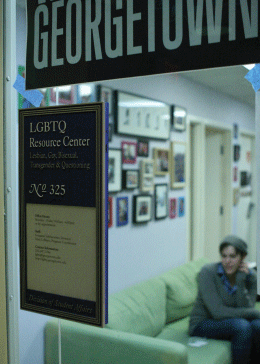
The Georgetown LGBTQ Resource Center hosted a panel to discuss the rights of transgender individuals in the military on Monday given the election of Donald Trump.
President-elect Donald Trump’s future administrative appointments could spark a significant rollback of transgender rights in the military, according to panelists hosted by the Georgetown LGBTQ Resource Center and the Georgetown University Veterans Office on Monday.
Georgetown’s Veterans Office Director LeNaya Hezel moderated the conversation between Shane McCammon, a veteran and graduate of the George Washington University Law School who studies issues affecting transgender individuals in the military, and Paula Neira, a lawyer, nurse and transgender Navy veteran.
McCammon said it is possible that under the Trump administration, the Pentagon may reinstate a ban on transgender individuals serving openly in the military, which was lifted June 30.
“Unfortunately, what happened Tuesday night has come so close in time to when this policy was going to come out,” McCammon said. “This is stuff that’s still being discussed and hammered out at the Pentagon. Hopefully there’s enough traction to keep this policy going, but I’m not super hopeful.”
Trump’s appointment to the Secretary of Defense position could reinstate the transgender ban without requiring approval from Congress or the courts, according to Neira.
“There was never a constitutional ruling about whether you can discriminate in the military against LGBT folks,” Neira said. “The transgender issue is completely within the authority of the executive branch. It can change with the mere stroke of a pen.”
However, Neira said reinstating the transgender ban may prove to be difficult, as the military has already begun to implement changes reflecting the new policy. Neira said it is more likely the ban will remain lifted, but the Republican-controlled Congress will pass a ‘religious liberty’ amendment in the next defense appropriations bill.
According to Neira, this provision would allow military personnel to discriminate against LGBTQ service members, justifying their conduct through religious beliefs.
“LGBT folks are going to be able to serve in the military, but if they are in a chain of command that wants to harass them, their chain of command is probably going to get away with it,” Neira said.
McCammon, whose law school thesis advocated for the removal of the U.S. military transgender ban, said evidence suggests military units function better when LGBTQ members are allowed to serve openly.
“When you boil it down, things work better when people are open and honest with each other,” McCammon said. “I’ve been deployed. I could really care less who’s sleeping with who, who’s using which bathroom; I care about if my colleague has my back and is doing his or her job. And I think more and more people are starting to understand that.”
Neira said her battle with transgender discrimination began in the United States Naval Academy, at a time when she was struggling with her own gender identity.
“At the time I knew something was different about my gender, but for me the military was a calling,” Neira said. “I knew since the time I was little being a naval officer was what I wanted to do. And I couldn’t say anything to anybody in the military, because the minute I asked for help, I would get kicked out.”
Neira said she faced a difficult choice between her identity and her career when trying to embrace her identity and start sex reassignment surgery.
“The hardest decision I ever made was telling the Navy I couldn’t stay. And again, I couldn’t tell them why,” Neira said.
After leaving the Navy, Neira attended nursing school and then law school. She became an advocate in the fight to allow LGBTQ people to serve openly in the military. Neira said her experiences in the Navy prompted her to jump into the fight.
“The sacrifice I had to make put me on the path to get involved,” Neira said. “I’m very humble and proud to be one of the people who helped lead the fight to change the Navy and the military so that today, LGBT kids don’t have to make those same sacrifices. And they’re going to be able to have the career that I couldn’t.”
Correction: This article previously stated the event was hosted by the Georgetown LGBTQ Resource Center; the event was hosted by the Georgetown LGBTQ Resource Center and the Georgetown University Veterans Office.





















Andy Lang • Nov 18, 2016 at 8:48 pm
Thanks for this excellent article! We’ve posted it on our Facebook page at https://facebook.com/ucc.coalition. We’re a coalition of 1,300 churches in the United Church of Christ that welcome and advocate for LGBTQ people in the church and in society. Understanding what direction the Trump Administration will take on LGBTQ civil rights is obviously a moving target: your article reinforces my concern that transgender people are especially at risk because their protections are largely the result of executive actions by the Obama Administration, which can easily be reversed. By the way, I’m a former Hoya news editor (1972-3). Delighted to see this standard of journalism kept alive!